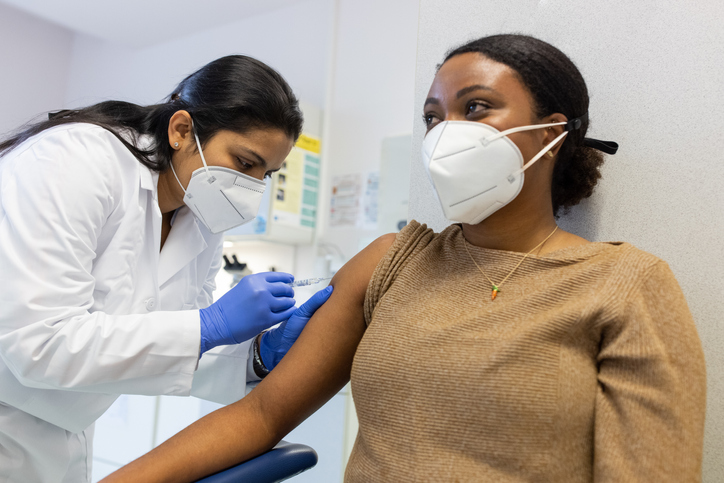Looking for a boost? What we know about the COVID-19 booster
- Category: New Orleans, Community, COVID-19, Health & Wellness
- Posted on:

Unsure if you should get a booster shot? Let's break it down:
- There are three COVID-19 vaccines authorized or approved for use in the United States to prevent COVID-19.
- The Centers for Disease Control (CDC) has updated its recommendations for COVID-19 vaccines with a preference for people to receive an mRNA COVID-19 vaccine: Pfizer-BioNTech and Moderna.
- You may get Johnson & Johnson’s Janssen COVID-19 vaccine in some situations. Read the CDC’s media statement.
Who can get a booster shot?
If you received Pfizer-BioNTech:
Who should get a booster:
- Adults 18 years and older
Who may get a booster:
- Teens 16-17 years old
When to get a booster:
- At least 6 months after completing your primary COVID-19 vaccination series
Which booster can you get:
- Pfizer-BioNTech or Moderna (mRNA COVID-19 vaccines) are preferred in most* situations
- Teens 16–17 years old may get a Pfizer-BioNTech COVID-19 vaccine booster
If you received Moderna:
Who should get a booster:
- Adults 18 years and older
When to get a booster:
- At least 6 months after completing your primary COVID-19 vaccination series
Which booster can you get:
- Pfizer-BioNTech or Moderna (mRNA COVID-19 vaccines) are preferred in most* situations
If you received Johnson & Johnson:
Who should get a booster:
- Adults 18 years and older
When to get a booster:
- At least 2 months after receiving your J&J/Janssen COVID-19 vaccination
Which booster can you get:
- Pfizer-BioNTech or Moderna (mRNA COVID-19 vaccines) are preferred in most* situations
*Although mRNA vaccines are preferred, J&J/Janssen COVID-19 vaccine may be considered in some situations.
What does immunocompromised mean?
Those who are moderately to severe immunocompromised are highly recommended to receive an additional dose of the COVID-19 vaccine. This includes:
- People receiving active cancer treatment for tumors or cancers of the blood
- People who've received an organ transplant and are taking medicine to suppress the immune system
- People who've received a stem cell transplant within the last 2 years or are taking medicine to suppress the immune system
- Moderate or severe primary immunodeficiency (such as DiGeorge syndrome, Wiskott-Aldrich syndrome)
- Advanced or untreated HIV infection
- Active treatment with high-dose corticosteroids or other drugs that may suppress your immune response
Talk to your healthcare provider about your medical condition, and whether getting an additional dose is appropriate for you.
Frequently asked questions:
What should I expect during and after my booster shot?
- Bring your CDC COVID-19 Vaccination Record card to your booster shot appointment so your provider can fill in the information about your booster dose. If you did not receive a card at your first appointment, contact the vaccination site where you got your first shot or your state health department to find out how you can get a card.
- You may experience side effects after getting a COVID-19 vaccine. These are normal signs that your body is building protection against COVID-19.
- Use v-safe to tell CDC about any side effects. If you enter your booster shot in your v-safe account, the system will send you daily health check-ins.
How long after getting my initial COVID-19 vaccines can I get an additional dose?
CDC recommends the additional dose of an mRNA COVID-19 vaccine be administered at least 6 months after a second dose of Pfizer-BioNTech COVID-19 vaccine or Moderna COVID-19 vaccine.
Can you mix and match the vaccines?
Yes. For people who received either Pfizer-BioNTech or Moderna’s COVID-19 vaccine series, a third dose of either mRNA COVID-19 vaccine product may be administered.
What are the benefits of people receiving an additional vaccine dose?
CDC recommends the additional dose of an mRNA COVID-19 vaccine be administered at least 6 months after a second dose of Pfizer-BioNTech COVID-19 vaccine or Moderna COVID-19 vaccine.
What are the risks of vaccinating individuals with an additional dose?
There is limited information about the risks of receiving an additional dose of vaccine, and the safety, efficacy, and benefit of additional doses of COVID-19 vaccine in immunocompromised people continues to be evaluated.
So far, reactions reported after the third mRNA dose were similar to that of the two-dose series: fatigue and pain at injection site were the most commonly reported side effects, and overall, most symptoms were mild to moderate.
However, as with the two-dose series, serious side effects are rare, but may occur.
Need a first dose of the COVID-19 vaccine?
The vaccine is available at over 1,400 providers across Louisiana, including LCMC Health and its six member hospitals.
Across the state, vaccine providers include national and independent pharmacies, public health providers, clinics and physician offices, hospitals and others.
For vaccine information or to schedule an appointment with a local provider, call 855-453-0774 (statewide number) or 504.290.5200 (LCMC Health vaccine hotline).
